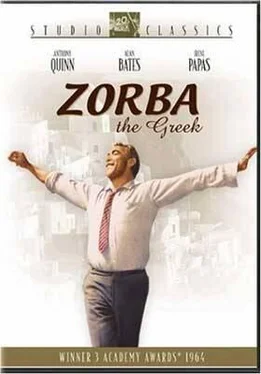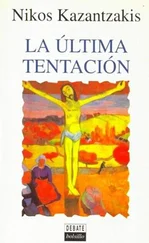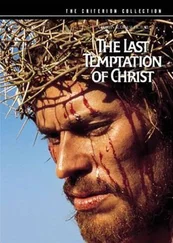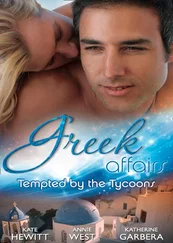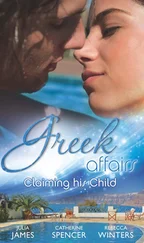Nikos Kazantzakis - Zorba The Greek
Здесь есть возможность читать онлайн «Nikos Kazantzakis - Zorba The Greek» весь текст электронной книги совершенно бесплатно (целиком полную версию без сокращений). В некоторых случаях можно слушать аудио, скачать через торрент в формате fb2 и присутствует краткое содержание. Жанр: Современная проза, на английском языке. Описание произведения, (предисловие) а так же отзывы посетителей доступны на портале библиотеки ЛибКат.
- Название:Zorba The Greek
- Автор:
- Жанр:
- Год:неизвестен
- ISBN:нет данных
- Рейтинг книги:3 / 5. Голосов: 1
-
Избранное:Добавить в избранное
- Отзывы:
-
Ваша оценка:
- 60
- 1
- 2
- 3
- 4
- 5
Zorba The Greek: краткое содержание, описание и аннотация
Предлагаем к чтению аннотацию, описание, краткое содержание или предисловие (зависит от того, что написал сам автор книги «Zorba The Greek»). Если вы не нашли необходимую информацию о книге — напишите в комментариях, мы постараемся отыскать её.
Zorba The Greek — читать онлайн бесплатно полную книгу (весь текст) целиком
Ниже представлен текст книги, разбитый по страницам. Система сохранения места последней прочитанной страницы, позволяет с удобством читать онлайн бесплатно книгу «Zorba The Greek», без необходимости каждый раз заново искать на чём Вы остановились. Поставьте закладку, и сможете в любой момент перейти на страницу, на которой закончили чтение.
Интервал:
Закладка:
"'I can't see any graves, captain,' I cried. 'Nor any dead. We shall get away with it once again, boys!' 'May God have heard you!' said our chief, who had not long been married. 'Just let me have a son! I don't care what happens after that.'"
Zorba cut himself a large piece from round the kidneys.
"That sheep was wonderful," he said, "but this one doesn't give a point away; it's a little beauty!"
"Pour out some wine, Zorba," I said. "Fill the glasses to the brim and we'll drain them."
We clinked glasses and tasted the wine, an exquisite Cretan wine, a rich red color, like hare's blood. When you drank it, you felt as if you were in communion with the blood of the earth itself and you became a sort of ogre. Your veins overflowed with strength, your heart with goodness! If you were a lamb you turned into a lion. You forgot the pettiness of life, constraints all fell away. United to man, beast and God, you felt that you were one with the universe.
"Look at this sheep's back and read what it says," I cried. "Go on, Zorba."
He very carefully sucked the pieces off the back, scraped it with his knife, held it up to the light and gazed at it attentively.
"Everything's fine," he said. "We shall live a thousand years, boss; we've hearts of steel!"
He bent down, examining the back again in the light from the fire.
"I see a journey," he said, "a long journey. At the end of it a large house with a lot of doors. It must be the capital of some kingdom, boss… or the monastery where I shall be doorkeeper, and where I'll do the smuggling, as we said?"
"Pour some wine, Zorba, and leave your prophecies. I'll tell you what the large house with all those doors really is: it's the earth and all its graves, Zorba. That's the end of the long voyage. Good health, you rascal!"
"Good health, boss! Luck is blind, they say. It can't see where it's going and keeps running into people… and the people it nocks into we call lucky! Well, to hell with luck if it's like that, say! We don't want it, do we, boss?"
"We don't, Zorba! Good health!"
We drank, finished off the sheep, and the world was somehow lighter-the sea looked happy, the earth swayed like the deck of a ship, two gulls walked across the pebbles chattering together like human beings.
I stood up.
"Come on, Zorba," I cried, "teach me to dance!"
Zorba leaped to his feet, his face sparkling.
"To dance, boss? To dance? Fine! Come on!"
"Off we go, then, Zorba! My life has changed! Let's have it!"
"To start with I'll teach you the Zéimhékiko. It's a wild, military dance; we always danced it when I was a comitadji, before going into battle."
He took off his shoes and purple socks and kept on only his shirt. But he was still too hot and removed that as well.
"Watch my feet, boss," he enjoined me. "Watch!"
He put out his foot, touched the ground lightly with his toes, then pointed the other foot; the steps were mingled violently, joyously, the ground reverberated like a drum.
He shook me by the shoulder.
"Now then, my boy," he said. "Both together!"
We threw ourselves into the dance. Zorba instructed me, corrected me gravely, patiently, and with great gentleness. I grew bold and felt my heart on the wing like a bird.
"Bravo! You're a wonder!" cried Zorba, clapping his hands to mark the beat. "Bravo, youngster! To hell with paper and ink! To hell with goods and profits! To hell with mines and workmen and monasteries! And now that you, my boy, can dance as well and have learnt my language, what shan't we be able to tell each other!"
He pounded on the pebbles with his bare feet and clapped his hands.
"Boss," he said, "I've dozens of things to say to you. I've never loved anyone as much before. I've hundreds of things to say, but my tongue just can't manage them. So I'll dance them for you! Here goes!"
He leaped into the air and his feet and arms seemed to sprout wings. As he threw himself straight in the air against that background of sea and sky, he looked like an old archangel in rebellion. For Zorba's dance was full of defiance and obstinacy. He seemed to be shouting to the sky: "What can you do to me, Almighty? You can do nothing to me except kill me. Well, kill me, I don't care! I've vented my spleen, I've said all I want to say; I've had time to dance… and I don't need you any more!"
Watching Zorba dance, I understood for the first time the fantastic efforts of man to overcome his weight. I admired Zorba's endurance, his agility and proud bearing. His clever and impetuous steps were writing on the sand the demoniac history of mankind.
He stopped, contemplated the shattered cable line and its series of heaps. The sun was declining, shadows were growing longer. Zorba turned to me and with a gesture common to hím, covered his mouth with his palm.
"I say, boss," he said, "did you see the showers of sparks the thing threw out?"
We burst out laughing.
Zorba threw himself on me, embraced and kissed me.
"Does it make you laugh, too?" he said tenderly. "Are you laughing, too? Eh, boss? Good!"
Rocking with laughter, we wrestled playfully with one another for some time. Then, falling to the ground, we stretched out on the pebbles and fell asleep in one another's arms.
I woke at dawn and walked rapidly along the beach towards the village; my heart was leaping in my breast. I had rarely felt so full of joy in my life. It was no ordinary joy, it was a sublime, absurd and unjustifiable gladness. Not only unjustifiable, contrary to all justification. This time I had lost everything-my money, my men, the line, the trucks; we had constructed a small port and now we had nothing to export. It was all lost.
Well, it was precisely at that moment that I felt an unexpected sense of deliverance. As if in the hard, somber labyrinth of necessity I had discovered liberty herself playing happily in a corner. And I played with her.
When everything goes wrong, what a joy to test your soul and see if it has endurance and courage! An invisible and all-powerful enemy-some call him God, others the Devil, seems to rush upon us to destroy us; but we are not destroyed.
Each time that within ourselves we are the conquerors, although. externally utterly defeated, we human beings feel an indescribable pride and joy. Outward calamity is transformed into a supreme and unshakable felicity.
I remember something Zorba told me once:
"One night on a snow-covered Macedonian mountain a terrible wind arose. It shook the little hut where I had sheltered and tried to tip it over. But I had shored it up and strengthened it. I was sitting alone by the fire, laughing at and taunting the wind. 'You won't get into my little hut, brother! I shan't open the door to you. You won't put my fire out; you won't tip my hut over!'"
In these few words of Zorba's I had understood how men should behave and what tone they should adopt when addressing powerful but blind necessity.
I walked rapidly along the beach, talking with the invisible enemy. I cried: "You won't get into my soul! I shan't open the door to you! You won't put my fire out; you won't tip me over!"
The sun had not yet peeped over the mountain. Colors played in the sky over the water-blues, greens, pinks, and mother-of-pearl; inland, among the olive trees, small birds were waking and chirping, intoxicated by the morning light.
I walked along the edge of the water to say goodbye to this solitary beach, to engrave it upon my mind and carry it away with me.
I had known much joy and many pleasures on that beach. My life with Zorba had enlarged my heart; some of his words had calmed my soul. This man with his infallible instinct and his primitive eagle-like look had taken confident short cuts and, without even losing his breath, had reached the peak of effort and had even gone farther.
Читать дальшеИнтервал:
Закладка:
Похожие книги на «Zorba The Greek»
Представляем Вашему вниманию похожие книги на «Zorba The Greek» списком для выбора. Мы отобрали схожую по названию и смыслу литературу в надежде предоставить читателям больше вариантов отыскать новые, интересные, ещё непрочитанные произведения.
Обсуждение, отзывы о книге «Zorba The Greek» и просто собственные мнения читателей. Оставьте ваши комментарии, напишите, что Вы думаете о произведении, его смысле или главных героях. Укажите что конкретно понравилось, а что нет, и почему Вы так считаете.
